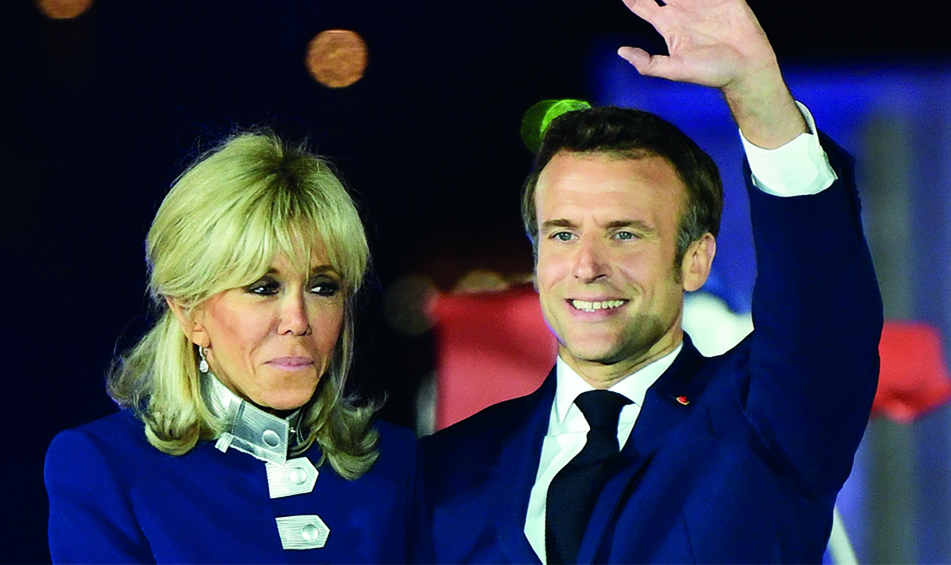PARIS: French President Emmanuel Macron sought to unite a deeply divided nation Monday after winning re-election in a battle against rival Marine Le Pen that saw the far right come its closest yet to taking power. Centrist Macron won 58.54 percent of the vote in the second-round run-off compared with 41.46 for Le Pen, according to final results from the interior ministry. Macron is the first French president in two decades to win a second term and his victory prompted a sigh of relief throughout Europe that the far right had again been thwarted from taking power in the key EU state.
But his latest victory over his far-right rival was narrower than their last face-off in 2017 when Macron won over 66 percent, and Le Pen's result was the best ever for the far right. The president already has a daunting in-tray, ranging from preparing for parliamentary elections as soon as June to implementing explosive pension reform plans and dealing with the Russian invasion of Ukraine.
'Everybody's president'
Addressing supporters in the shadow of the Eiffel Tower late Sunday, Macron vowed to heal rifts in a deeply divided country. "From now on, I am not the candidate of one camp, but everybody's president," he said. "An answer must be found to the anger and disagreements that led many of our compatriots to vote for the extreme right."
Turnout was the lowest in any presidential election second-round run-off since 1969 and, in another striking sign of disenchantment with politics, 8.6 percent of people who voted either delivered a blank ballot or spoilt their papers. The 44-year-old president now faces the challenge of parliamentary elections in June, where keeping a majority will be critical for his ambitions.
In a sign of roadblocks ahead, two polls published late Sunday showed that most voters do not wish for him to also carry the parliamentary vote. "Macron's biggest challenge will be to create a sense of cohesion in an extremely fragmented country," said Tara Varma, senior policy fellow and head of the Paris office of the European Council on Foreign Relations.
'Victory without triumph'
French daily Le Monde called Macron's win "an evening of victory without a triumph", while left-leaning Liberation called it "a victory without the glory". Conservative daily Le Figaro said after all the challenges of his first term, Macron's win was "no mean feat", but also asked: "Who can possibly believe that it is rooted in popular support?"
For Le Pen, her third defeat in a presidential poll was a bitter pill after years of effort at making herself electable. On Sunday Le Pen, 53, said she would "never abandon" the French and was already preparing for the June legislative elections. Macron's re-election sparked relief across Europe where he has been seen as a guarantor of continuity.
Italian Prime Minister Mario Draghi called Macron's victory "great news for all of Europe" while German Chancellor Olaf Scholz said French voters "sent a strong vote of confidence in Europe today". European Council president Charles Michel said the bloc could now "count on France for five more years" while European Commission chief Ursula von der Leyen said she was "delighted".
The praise was echoed by other world leaders, including US President Joe Biden, Canada's Prime Minister Justin Trudeau and Australian Prime Minister Scott Morrison. Russian President Vladimir Putin-who Macron has unsuccessfully sought to persuade to end the invasion of Ukraine-said Monday he wished the French president "success in your state activities, as well as good health and well-being".
'A true friend'
Ukrainian leader Volodymyr Zelensky told Macron he was "a true friend of Ukraine". China's President Xi Jinping said he wanted "to maintain diplomatic relations based on independence, mutual understanding, foresight and mutual benefit" with Macron.
The French leader will now try to implement his vision of more pro-business reform and tighter EU integration, after a first term shadowed by protests, then the coronavirus pandemic and finally Russia's invasion of Ukraine. The president's re-election failed to spark much positive sentiment on the Paris stock exchange, where investors paid more attention to geopolitical worries and inflation fears, but also noted France's coming challenges.
Analysts at Danske Bank said he "is facing growing headwinds both from the economy, and growing divisions" which they said "could make it difficult for Macron to continue his ambitious reform of the pension, health and education systems". The euro fell back against the dollar, having earlier recorded small gains on the election result. - AFP










